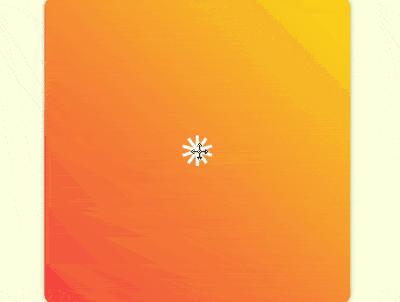如何使用CSS与GSAP完成有多个关键帧的连续动画(附源码)
时间:2024/3/5作者:未知来源:争怎路由网人气:
- 网页的本质就是超级文本标记语言,通过结合使用其他的Web技术(如:脚本语言、公共网关接口、组件等),可以创造出功能强大的网页。因而,超级文本标记语言是万维网(Web)编程的基础,也就是说万维网是建立在超文本基础之上的。超级文本标记语言之所以称为超文本标记语言,是因为文本中包含了所谓“超级链接”点。本篇文章给大家带来的内容是关于如何使用CSS和GSAP实现有多个关键帧的连续动画(附源码),有一定的参考价值,有需要的朋友可以参考一下,希望对你有所帮助。
效果预览

源代码下载
https://github.com/comehope/front-end-daily-challenges
代码解读
定义 dom,容器中包含 10 个
p子元素,每个p中包含 1 个span元素:<figure class="container"> <div><span></span></div> <div><span></span></div> <div><span></span></div> <div><span></span></div> <div><span></span></div> <div><span></span></div> <div><span></span></div> <div><span></span></div> <div><span></span></div> <div><span></span></div> </figure>居中显示:
body { margin: 0; height: 100vh; display: flex; align-items: center; justify-content: center; background-color: lightyellow; }定义容器的尺寸和样式:
.container { width: 400px; height: 400px; background: linear-gradient(45deg, tomato, gold); border-radius: 3%; box-shadow: 0 0 10px rgba(0, 0, 0, 0.3); }画出容器里的 1 个元素,它有一个外壳
p,里面是一个白色的小方块span:.container { position: relative; } .container p { position: absolute; width: inherit; height: inherit; display: flex; align-items: center; justify-content: center; } .container p span { position: absolute; width: 40px; height: 40px; background-color: white; }为容器中的元素定义下标变量,并让元素的外壳依次旋转,围合成一个圆形,其中
outline是辅助线:.container p { outline: 1px dashed black; transform: rotate(calc((var(--n) - 1) * 36deg)); } .container p:nth-child(1) { --n: 1; } .container p:nth-child(2) { --n: 2; } .container p:nth-child(3) { --n: 3; } .container p:nth-child(4) { --n: 4; } .container p:nth-child(5) { --n: 5; } .container p:nth-child(6) { --n: 6; } .container p:nth-child(7) { --n: 7; } .container p:nth-child(8) { --n: 8; } .container p:nth-child(9) { --n: 9; } .container p:nth-child(10) { --n: 10; }至此,子元素绘制完成,接下来开始写动画脚本。
引入 GSAP 库:<script src="https://cdnjs.cloudflare.com/ajax/libs/gsap/2.0.2/TweenMax.min.js"></script>
定义一个变量,代表子元素选择器:
let elements = '.container p span';
声明一个时间线对象:
let animation = new TimelineMax();
先设定入场方式为由小(第1帧)变大(第2帧),其中并没有第 2 帧的代码,它是隐含在语义中的:
animation.from(elements, 1, {scale: 0});让子元素变成竖长条,向四周散开(第3帧):
animation.from(elements, 1, {scale: 0}) .to(elements, 1, {y: '-100px', scaleX: 0.25});让竖长条旋转着变成小方块(第4帧):
animation.from(elements, 1, {scale: 0}) .to(elements, 1, {y: '-100px', scaleX: 0.25}) .to(elements, 1, {scaleY: 0.25, rotation: 180});让小方块变成横长条,围成一个圆形(第5帧):
animation.from(elements, 1, {scale: 0}) .to(elements, 1, {y: '-100px', scaleX: 0.25}) .to(elements, 1, {scaleY: 0.25, rotation: 180}) .to(elements, 1, {scaleX: 1});注意,因 scrimba 在录制过多帧时会崩溃,所以第 6 帧至第 11 帧没有在视频中体现。
让圆形向内收敛,同时线条变细(第6帧):animation.from(elements, 1, {scale: 0}) .to(elements, 1, {y: '-100px', scaleX: 0.25}) .to(elements, 1, {scaleY: 0.25, rotation: 180}) .to(elements, 1, {scaleX: 1}) .to(elements, 1, {y: '-60px', scaleY: 0.1});让线条向左摆动(第7帧):
animation.from(elements, 1, {scale: 0}) .to(elements, 1, {y: '-100px', scaleX: 0.25}) .to(elements, 1, {scaleY: 0.25, rotation: 180}) .to(elements, 1, {scaleX: 1}) .to(elements, 1, {y: '-60px', scaleY: 0.1}) .to(elements, 1, {x: '-30px'});再让线条向右摆动(第8帧):
animation.from(elements, 1, {scale: 0}) .to(elements, 1, {y: '-100px', scaleX: 0.25}) .to(elements, 1, {scaleY: 0.25, rotation: 180}) .to(elements, 1, {scaleX: 1}) .to(elements, 1, {y: '-60px', scaleY: 0.1}) .to(elements, 1, {x: '-30px'}) .to(elements, 1, {x: '30px'});再把横线变为竖线,造型与第 3 帧相似,只是线更细,更向内收敛(第9帧):
animation.from(elements, 1, {scale: 0}) .to(elements, 1, {y: '-100px', scaleX: 0.25}) .to(elements, 1, {scaleY: 0.25, rotation: 180}) .to(elements, 1, {scaleX: 1}) .to(elements, 1, {y: '-60px', scaleY: 0.1}) .to(elements, 1, {x: '-30px'}) .to(elements, 1, {x: '30px'}) .to(elements, 1, {x: '0', scaleX: 0.1, scaleY: 1});再把竖线变为横线,造型与第 5 帧相似,但线短一些(第10帧):
animation.from(elements, 1, {scale: 0}) .to(elements, 1, {y: '-100px', scaleX: 0.25}) .to(elements, 1, {scaleY: 0.25, rotation: 180}) .to(elements, 1, {scaleX: 1}) .to(elements, 1, {y: '-60px', scaleY: 0.1}) .to(elements, 1, {x: '-30px'}) .to(elements, 1, {x: '30px'}) .to(elements, 1, {x: '0', scaleX: 0.1, scaleY: 1}) .to(elements, 1, {scaleX: 0.5, scaleY: 0.1})横线稍向外扩散,变为圆点(第11帧):
animation.from(elements, 1, {scale: 0}) .to(elements, 1, {y: '-100px', scaleX: 0.25}) .to(elements, 1, {scaleY: 0.25, rotation: 180}) .to(elements, 1, {scaleX: 1}) .to(elements, 1, {y: '-60px', scaleY: 0.1}) .to(elements, 1, {x: '-30px'}) .to(elements, 1, {x: '30px'}) .to(elements, 1, {x: '0', scaleX: 0.1, scaleY: 1}) .to(elements, 1, {scaleX: 0.5, scaleY: 0.1}) .to(elements, 1, {y: '-80px', scaleY: 0.5, borderRadius: '50%'});让圆点变形为竖线,并向内收缩,这个变化的距离长,所以动画时间也要长一些(第12帧):
animation.from(elements, 1, {scale: 0}) .to(elements, 1, {y: '-100px', scaleX: 0.25}) .to(elements, 1, {scaleY: 0.25, rotation: 180}) .to(elements, 1, {scaleX: 1}) .to(elements, 1, {y: '-60px', scaleY: 0.1}) .to(elements, 1, {x: '-30px'}) .to(elements, 1, {x: '30px'}) .to(elements, 1, {x: '0', scaleX: 0.1, scaleY: 1}) .to(elements, 1, {scaleX: 0.5, scaleY: 0.1}) .to(elements, 1, {y: '-80px', scaleY: 0.5, borderRadius: '50%'}) .to(elements, 1, {y: '-10px', scaleX: 0.1, scaleY: 0.5, borderRadius: '0%', rotation: 0});让竖线从中心向外快速扩散,扩散前稍停片刻,好像线条都被发射出一样(第13帧):
animation.from(elements, 1, {scale: 0}) .to(elements, 1, {y: '-100px', scaleX: 0.25}) .to(elements, 1, {scaleY: 0.25, rotation: 180}) .to(elements, 1, {scaleX: 1}) .to(elements, 1, {y: '-60px', scaleY: 0.1}) .to(elements, 1, {x: '-30px'}) .to(elements, 1, {x: '30px'}) .to(elements, 1, {x: '0', scaleX: 0.1, scaleY: 1}) .to(elements, 1, {scaleX: 0.5, scaleY: 0.1}) .to(elements, 1, {y: '-80px', scaleY: 0.5, borderRadius: '50%'}) .to(elements, 1, {y: '-10px', scaleX: 0.1, scaleY: 0.5, borderRadius: '0%', rotation: 0}) .to(elements, 1, {y: '-300px', delay: 0.5});用时间尺度缩放函数让动画播放速度加快一倍:
animation.from(elements, 1, {scale: 0}) .to(elements, 1, {y: '-100px', scaleX: 0.25}) .to(elements, 1, {scaleY: 0.25, rotation: 180}) .to(elements, 1, {scaleX: 1}) .to(elements, 1, {y: '-60px', scaleY: 0.1}) .to(elements, 1, {x: '-30px'}) .to(elements, 1, {x: '30px'}) .to(elements, 1, {x: '0', scaleX: 0.1, scaleY: 1}) .to(elements, 1, {scaleX: 0.5, scaleY: 0.1}) .to(elements, 1, {y: '-80px', scaleY: 0.5, borderRadius: '50%'}) .to(elements, 1, {y: '-10px', scaleX: 0.1, scaleY: 0.5, borderRadius: '0%', rotation: 0}) .to(elements, 1, {y: '-300px', delay: 0.5}) .timeScale(2);修改声明时间线的代码,使动画重复播放:
let animation = new TimelineMax({repeat: -1, repeatDelay: 1});至此,动画完成。
隐藏容器外的内容,并删掉辅助线;.container { overflow: hidden; } .container p { /* outline: 1px dashed black; */ }最后,装饰一下页面的角落:
body { overflow: hidden; } body::before, body::after { content: ''; position: absolute; width: 60vmin; height: 60vmin; border-radius: 50%; background: radial-gradient( transparent 25%, gold 25%, gold 50%, tomato 50% ); } body::before { left: -30vmin; bottom: -30vmin; } body::after { right: -30vmin; top: -30vmin; }大功告成!
相关推荐:
以上就是如何使用CSS和GSAP实现有多个关键帧的连续动画(附源码)的详细内容,更多请关注php中文网其它相关文章!
网站建设是一个广义的术语,涵盖了许多不同的技能和学科中所使用的生产和维护的网站。
关键词:如何运用CSS与GSAP完成有多个关键帧的连续动画(附源码)